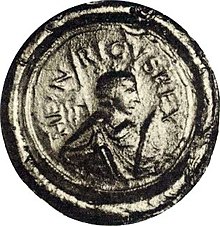Henry I of Germany
| Henry the Fowler | |
|---|---|

Henry's seal from a document of 30 March 925. He is portrayed as a warrior, with a spear and shield. The words are HEINRICUS REX (King Henry).
|
|
| King of East Francia | |
| Reign | 24 May 919 – 2 July 936 |
| Predecessor | Conrad I of Germany |
| Successor | Otto the Great |
| Duke of Saxony | |
| Reign | 30 November 912 – 2 July 936 |
| Predecessor | Otto I, Duke of Saxony |
| Successor | Otto the Great |
| Born | c. 876 |
| Died | 2 July 936 Memleben |
| Burial | Quedlinburg Abbey |
| Spouse | |
| Issue | |
| Dynasty | Ottonian |
| Father | Otto I, Duke of Saxony |
| Mother | Hedwiga |
| Religion | Roman Catholic |
| German royal dynasties | |||
| Ottonian dynasty | |||
| Chronology | |||
| Henry I | 919 – 936 | ||
| Otto I | 936 – 973 | ||
| Otto II | 973 – 983 | ||
| Otto III | 983 – 1002 | ||
| Henry II | 1002 – 1024 | ||
| Family | |||
|
Family tree of the German monarchs |
|||
| Succession | |||
|
Preceded by Conradine dynasty |
Followed by Salian dynasty |
||
Henry the Fowler (German: Heinrich der Finkler or Heinrich der Vogler; Latin: Henricius Auceps) (876 – 2 July 936) was the duke of Saxony from 912 and the elected king of East Francia (Germany) from 919 until his death in 936. As the first non-Frankish king, he established the Ottonian Dynasty of kings and emperors, he is generally considered to be the founder and first king of the medieval German state, known until then as East Francia. An avid hunter, he obtained the epithet "the Fowler" because he was allegedly fixing his birding nets when messengers arrived to inform him that he was to be king. By his death in July 936 Henry had prevented collapse of royal power, as had happened in West Francia, and left a much stronger kingdom to his successor Otto I. Henry died on 2 July 936 in his royal palace in Memleben, one of his favourite places. He was buried at Quedlinburg Abbey, established by his wife Matilda in his honor.
Born in Memleben, in what is now Saxony-Anhalt, Henry was the son of Otto the Illustrious, Duke of Saxony, and his wife Hedwiga, daughter of Henry of Franconia and Ingeltrude and a great-great-granddaughter of Charlemagne. In 906 he married Hatheburg von Merseburg, daughter of the Saxon count Erwin. She had previously been a nun. The marriage was annulled in 909 because her vows as a nun were deemed by the church to remain valid. She had already given birth to Henry's son Thankmar. The annulment placed a question mark over Thankmar's legitimacy. Later that year he married Matilda, daughter of Dietrich of Ringelheim, Count in Westphalia. Matilda bore him three sons, one called Otto, and two daughters, Hedwig and Gerberga, and founded many religious institutions, including the Quedlinburg Abbey where Henry is buried. She was later canonized.
...
Wikipedia
